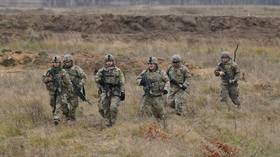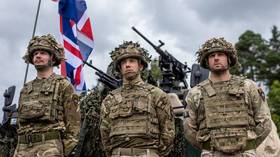UK warned of waning influence in NATO

The UK is at risk of losing its status of major NATO power due to its relatively small military, Deputy Supreme Allied Commander Europe General Tim Radford warned in an interview released on Tuesday.
Speaking to the Daily Telegraph, the NATO official outlined that the UK, which has enjoyed a position of influence within the US-led military bloc since its establishment after WWII, is now “in danger of not holding on” to it.
“I think we [the British military] are too small,” Radford said. He went on to describe the UK’s position within NATO as “fortunate,” but added: “I worry that if we don’t invest and we don’t build up our industrial base and we don’t lead as we should, we might lose that position.”
One of Radford’s major grievances is the declining numbers in the UK army, which is set to decrease to 73,000, according to plans announced as early as 2021. He also warned that the advanced technologies which London is heavily betting on are not capable of fully replacing military personnel.
“I think we’ve had a slight awakening after Ukraine, but we need to do a twin track approach,” Radford noted. While recognizing the importance of innovation in the military, he pointed out that this potential should “be underpinned with hard fighting power.”
“If someone comes toward you with a tank, you can’t cyber it away. You can’t cross a bridge with cyber. It needs to be balanced,” he said.
Radford’s remarks come after UK Defence Secretary Ben Wallace stated in January that the nation’s military is “hollowed out and underfunded.” That same month, Sky News reported that an unnamed senior US general privately told Wallace that the British military was no longer considered a top-level fighting force due to decades of defense cuts.
Despite this apparent criticism, in May, the Times reported that Wallace still planned to press forward with plans to cut the army’s size, intending to reduce the number of infantry in favor of artillery.
At the same time, the UK emerged as one of the most active supporters of Ukraine in its conflict with Russia, pledging £4.6 billion ($5.9 billion) in military assistance. It was also the first country to offer modern battle tanks to Kiev, later pledging to provide it with depleted-uranium shells, leaving Moscow furious.












